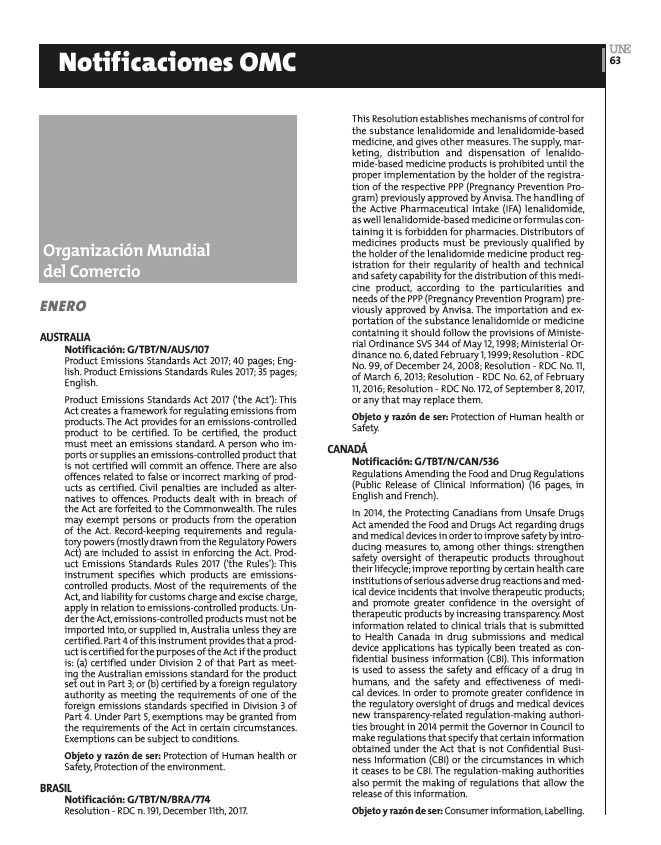
Notificaciones OMC 63
Organización Mundial
del Comercio
ENERO
AUSTRALIA
Notificación: G/TBT/N/AUS/107
Product Emissions Standards Act 2017; 40 pages; English.
Product Emissions Standards Rules 2017; 35 pages;
English.
Product Emissions Standards Act 2017 (‘the Act’): This
Act creates a framework for regulating emissions from
products. The Act provides for an emissions-controlled
product to be certified. To be certified, the product
must meet an emissions standard. A person who imports
or supplies an emissions‑controlled product that
is not certified will commit an offence. There are also
offences related to false or incorrect marking of products
as certified. Civil penalties are included as alternatives
to offences. Products dealt with in breach of
the Act are forfeited to the Commonwealth. The rules
may exempt persons or products from the operation
of the Act. Record-keeping requirements and regulatory
powers (mostly drawn from the Regulatory Powers
Act) are included to assist in enforcing the Act. Product
Emissions Standards Rules 2017 (‘the Rules’): This
instrument specifies which products are emissionscontrolled
products. Most of the requirements of the
Act, and liability for customs charge and excise charge,
apply in relation to emissions-controlled products. Under
the Act, emissions-controlled products must not be
imported into, or supplied in, Australia unless they are
certified. Part 4 of this instrument provides that a product
is certified for the purposes of the Act if the product
is: (a) certified under Division 2 of that Part as meeting
the Australian emissions standard for the product
set out in Part 3; or (b) certified by a foreign regulatory
authority as meeting the requirements of one of the
foreign emissions standards specified in Division 3 of
Part 4. Under Part 5, exemptions may be granted from
the requirements of the Act in certain circumstances.
Exemptions can be subject to conditions.
Objeto y razón de ser: Protection of Human health or
Safety, Protection of the environment.
BRASIL
Notificación: G/TBT/N/BRA/774
Resolution - RDC n. 191, December 11th, 2017.
This Resolution establishes mechanisms of control for
the substance lenalidomide and lenalidomide-based
medicine, and gives other measures. The supply, marketing,
distribution and dispensation of lenalidomide
based medicine products is prohibited until the
proper implementation by the holder of the registration
of the respective PPP (Pregnancy Prevention Program)
previously approved by Anvisa. The handling of
the Active Pharmaceutical Intake (IFA) lenalidomide,
as well lenalidomide-based medicine or formulas containing
it is forbidden for pharmacies. Distributors of
medicines products must be previously qualified by
the holder of the lenalidomide medicine product registration
for their regularity of health and technical
and safety capability for the distribution of this medicine
product, according to the particularities and
needs of the PPP (Pregnancy Prevention Program) previously
approved by Anvisa. The importation and exportation
of the substance lenalidomide or medicine
containing it should follow the provisions of Ministerial
Ordinance SVS 344 of May 12, 1998; Ministerial Ordinance
no. 6, dated February 1, 1999; Resolution - RDC
No. 99, of December 24, 2008; Resolution - RDC No. 11,
of March 6, 2013; Resolution - RDC No. 62, of February
11, 2016; Resolution - RDC No. 172, of September 8, 2017,
or any that may replace them.
Objeto y razón de ser: Protection of Human health or
Safety.
CANADÁ
Notificación: G/TBT/N/CAN/536
Regulations Amending the Food and Drug Regulations
(Public Release of Clinical Information) (16 pages, in
English and French).
In 2014, the Protecting Canadians from Unsafe Drugs
Act amended the Food and Drugs Act regarding drugs
and medical devices in order to improve safety by introducing
measures to, among other things: strengthen
safety oversight of therapeutic products throughout
their lifecycle; improve reporting by certain health care
institutions of serious adverse drug reactions and medical
device incidents that involve therapeutic products;
and promote greater confidence in the oversight of
therapeutic products by increasing transparency. Most
information related to clinical trials that is submitted
to Health Canada in drug submissions and medical
device applications has typically been treated as confidential
business information (CBI). This information
is used to assess the safety and efficacy of a drug in
humans, and the safety and effectiveness of medical
devices. In order to promote greater confidence in
the regulatory oversight of drugs and medical devices
new transparency-related regulation-making authorities
brought in 2014 permit the Governor in Council to
make regulations that specify that certain information
obtained under the Act that is not Confidential Business
Information (CBI) or the circumstances in which
it ceases to be CBI. The regulation-making authorities
also permit the making of regulations that allow the
release of this information.
Objeto y razón de ser: Consumer information, Labelling.